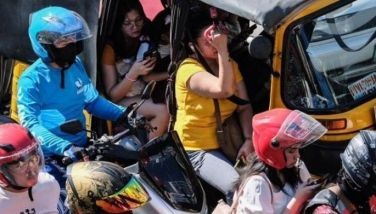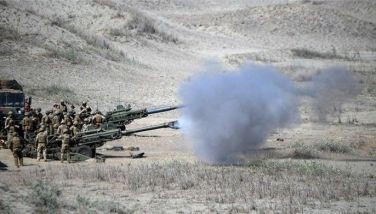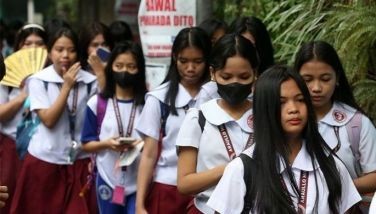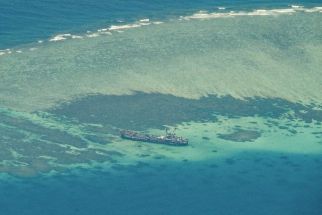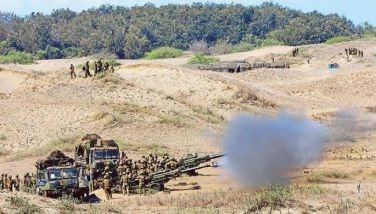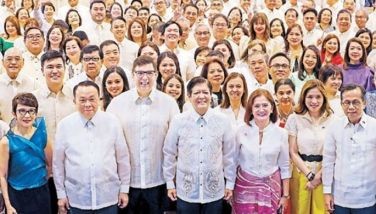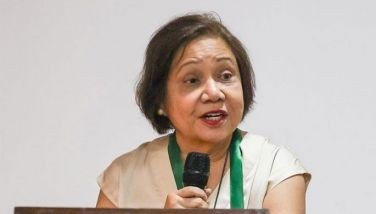‘US not escorting trips to Ayungin’
NSC exec: This is our EEZ, this is our outpost
MANILA, Philippines — Despite increasing Chinese harassment of Philippine vessels, the country will continue resupply missions to Ayungin Shoal on its own, without outside help, according to a ranking official of the National Security Council.
NSC Assistant Director General Jonathan Malaya also said the government is readying “some adjustments” in the resupply missions to the BRP Sierra Madre, a rusty ship that serves as a Philippine military outpost on Ayungin (Second Thomas) Shoal.
Malaya declined to provide details, but there have been suggestions for the government to stop using privately owned wooden vessels, which are easily damaged by water cannons of the China Coast Guard (CCG), for the resupply missions.
He issued the statements as the government prepares for President Marcos’ trilateral meeting next week in Washington with US President Joe Biden and Japanese Prime Minister Fumio Kishida.
While tensions in the South China Sea are on the agenda, Malaya ruled out the possibility of the Philippines seeking or accepting US escorts for Philippine missions to Ayungin despite constant Chinese harassment.
“We intend to keep this a Philippine mission manned by Philippine personnel using Philippine vessels,” Malaya told “Storycon” yesterday on One News.
“We will do this on our own. It is our exclusive economic zone. It is therefore the primary responsibility of the Philippine government’s and no one else’s,” he stressed.
There are unconfirmed reports that the US offered to provide ship escorts for the resupply missions conducted by the Philippine Coast Guard, backed by the Philippine Navy, to Ayungin.
“We will have some adjustments in our resupply missions,” Malaya said, adding that the NSC has submitted recommendations for tweaking the missions.
Among the recommendations, he said, was the reorganization of the National Coast Watch Council into the National Maritime Council.
Malaya stressed that the PCG hired privately owned wooden vessels for the resupply missions precisely so that China would not construe it as a military provocation. Yet even the wooden vessels were constantly targeted by the CCG with water cannon bombardment.
He reiterated his challenge to Beijing to identify the Philippine official who supposedly promised China that the Sierra Madre would be removed from Ayungin – a story that the Philippine government has denied.
Officials have said the trilateral meeting in Washington aims to ensure peace and stability in the Indo-Pacific region and will tackle tensions in the SCS and the Taiwan Strait as well as the war in Ukraine.
“But maybe they’ll consider this as provocative because remember, our regular resupply missions to Ayungin, even if we use small supply boats, they still consider it as provocative, they consider it as not helpful in resolving issues and an escalation on their end,” Malaya said.
“So I don’t exactly know how they’re going to respond but if they say that this kind of arrangement, trilateral summit, is a provocation, I would not be surprised,” he pointed out.
Moreover, he added, the Philippines is under no obligation to make any explanations to China as it is the Filipinos who should be made aware “that all of the three nations face similar challenges, all of the three nations value the same things in life, they adhere to certain values and principles.”
Not directed at China
The Department of Foreign Affairs stressed that the “historic” meeting is “not directed at any country.”
“I think we can expect a discussion on the recent incidents (in the WPS),” Foreign Affairs Undersecretary Hans Mohaimin Siriban told reporters at a briefing at Malacañang.
“This trilateral summit is significant to help further promote dialogue and peace in the region,” he said.
“And these are countries that share the Philippines’ goal of promoting an international rules-based order and to promote peace and stability in the region.”
Siriban indicated that a formal trilateral alliance may take shape but declined to give details except to say that it “is in the initial stages.”
“We are still developing the mechanisms to cooperate on a trilateral basis but I think this trilateral cooperation should be seen as something that will help additional efforts in the region, especially this trilateral cooperation supports existing mechanisms like ASEAN and the ASEAN outlook on the Indo-Pacific,” he said when asked whether the meeting would lead to formalization of such an alliance.
On Thursday, Marcos told newly appointed Japanese Ambassador Endo Kazuya during the latter’s courtesy call at Malacañang that he was expecting some kind of trilateral agreement after the White House summit.
“So, these are building blocks that I think are good for the region, for our countries of course, but for the region. Let’s just do the work to continue to keep the peace, that is to make the most important part of all that we do,” the President told Kazuya.
“As I say this, keep the South China Sea an area as part of the world where there is freedom of navigation and trade. That’s all we wish for and so we are happy that once we try to do that, we have you,” he said.
Siriban stressed the three leaders are expected to discuss their common vision for the Indo-Pacific region, as well as explore opportunities for enhancing trilateral cooperation across various areas of mutual interest, including inclusive economic growth.
“And the main goal really is to deepen, first and foremost, the natural strengths that we’ve had, that we’ve shared over the years – Japan and the United States have been our long traditional allies and partners not only in defense and security but also in economic cooperation. So, we hope to be able to deepen these engagements even further,” he said.
The three leaders are expected to come up with a “joint vision statement” on their diplomatic relations.
“We can expect an alignment of views among the three countries on the recent incidents (in the WPS),” Siriban said.
Marcos discussed the merits and prospects of a trilateral agreement during his state visit to Tokyo in February last year. Japan also has a territorial dispute with China over the East China Sea.
The Philippines and Japan have ongoing negotiations on a Reciprocal Access Agreement (RAA) to facilitate visits to each other’s country by the Japanese Self-Defense Forces and the Philippine military.
Siriban said the Philippines hopes a trilateral cooperation would capacitate the country in terms of training in maritime security, including capacity building and provision of equipment.
“This is our hope that this (trilateral cooperation) will help promote a more conducive environment to allow our people to travel and do their livelihoods in our seas,” he said.
The three leaders are expected to explore opportunities for enhancing cooperation across various areas of mutual interest, including inclusive economic growth, developing critical and emerging technologies, climate change and clean energy and supply chains.
Siriban said the security environment in the region would also have to be taken into consideration in the charting of economic initiatives.
He said Biden and Marcos are set to hold a bilateral meeting ahead of the trilateral summit.
Marcos is also expected to have a separate meeting with US Defense Secretary Lloyd Austin and business leaders in Washington.
The President is expected to return to Manila right after the summit on April 12, according to Siriban. – Helen Flores
- Latest
- Trending















